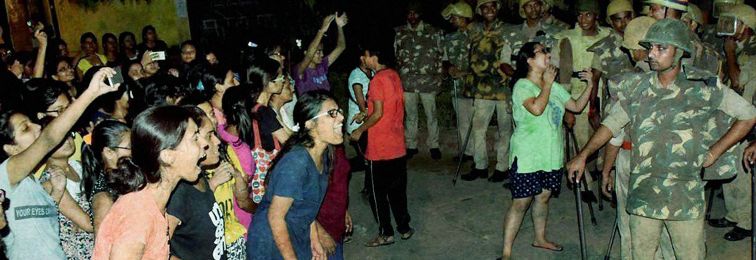In September 2017, Banaras Hindu University (BHU) was shaken by widespread student protests that catapulted the institution onto the national stage.
Last year, in September, thousands of students, especially girls, spoke up in protest when a BHU student was molested by three men on campus. When the girl went to the proctor and warden to file a complaint, they refused to act on her claims, instead blaming her for the incident. Angry at this response, students started protesting to demand a safer and more democratic campus for themselves.
This was something of a historical moment for BHU as it was the first time that female students left their hostels at night and came out in such large numbers to gather at the university’s main gate.
However, this peaceful protest took a violent turn when protestors were lathi charged by the police. Several girls were badly injured. After this brutal act, BHU students got support from other campuses across the country and many other activists and civil society members. The protestors cause struck a nation-wide chord, giving rise to several solidarity protests in different parts of India.
All this led the vice chancellor, G.C. Tripathi, going on indefinite leave. The matter was eventually handed over to a committee headed by former high court judge V.K. Dikshit, who released a report on the committee’s findings on 25 April 2018. The report gave a clean chit to Tripathi and said the protest was “politicised and sponsored”.
The report’s release was followed by BHU’s newly appointed proctor, Royana Singh, appearing on a TV news channel to declare that the protests were sponsored and that students had distributed pizzas and burgers during the protest.
After the statement aired, students who had participated in the protest, including those who’d been injured in the lathi charge, went to the proctor’s office on May 2, but she refused to meet them. The students claimed that Singh had maligned the protest by labelling it sponsored.
The next day, Singh lodged complaints against the students with the police and also constituted a standing committee to probe the matter. Surprisingly, the proctor herself was part of the committee, despite being the complainant.
While the police cleared the students of any charges, BHU’s standing committee found some students guilty and has debarred them from the university.
One of the debarred students, Aparna Sanjay, a third year student from the Mahila Maha Vidhyalaya said, “When we demanded safety and justice for us in September, we got lathis and when we went to talk to the chief proctor who maligned our protest, then the false charges were put against us and we got debarred from the university. Instead of taking action on the accused, the administration is harassing its own students who raised their voice against injustice.”
Sanjay’s hostel seat was cancelled, with the official reason given that she was sitting on a dharna.
Shubham Ahake, also debarred, said, “I come from an Adivasi community and it has been really challenging for me to come BHU for my studies. It is painful for me that just because I raised my voice against sexual harassment in the campus, I won’t be able to continue my studies.” He added, “This is really unfortunate and is an undemocratic action taken by the BHU administration.”
On the debarring, BHU’s public relations officer, Rajesh Singh, said, “There is no space of protests or dharnas in our campus.” He refused to say anything on the police report. Only adding that the “administration will go according to the report of the standing committee.”
He further added, “if the students apologise and give undertaking of not being part of any protest and demonstration in future, the university will not punish them.”
Despite the issue being brought up in parliament, the university’s administration does not seem like it will budge from its decision.
As a former BHU student, I have always felt that the administration is regressive and patriarchal, and maintains a highly undemocratic atmosphere on campus. If the university is indeed a space for knowledge gathering and creation, then why are students being deprived of their right to do so?

